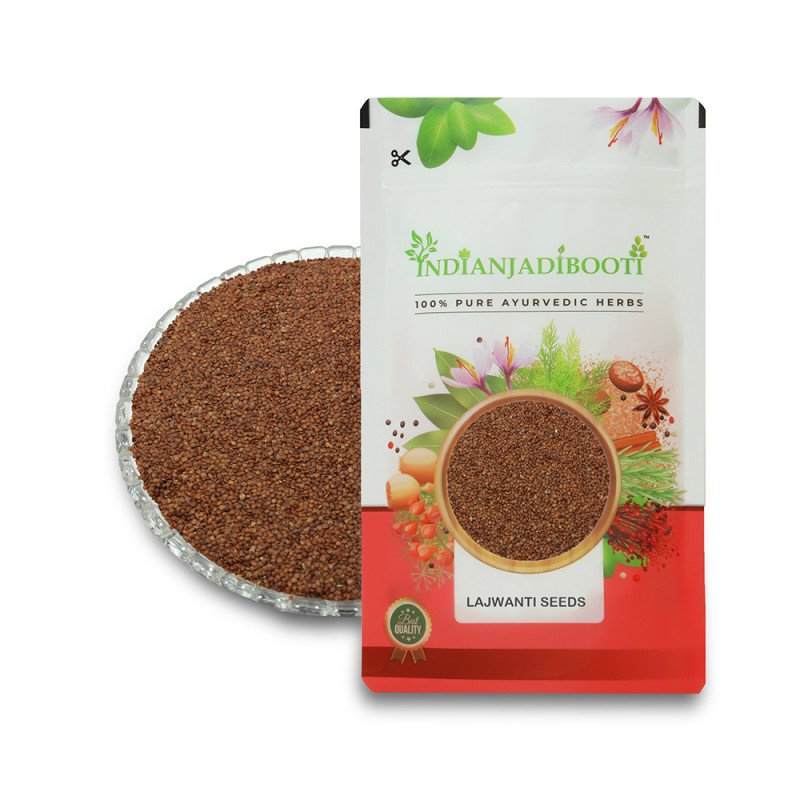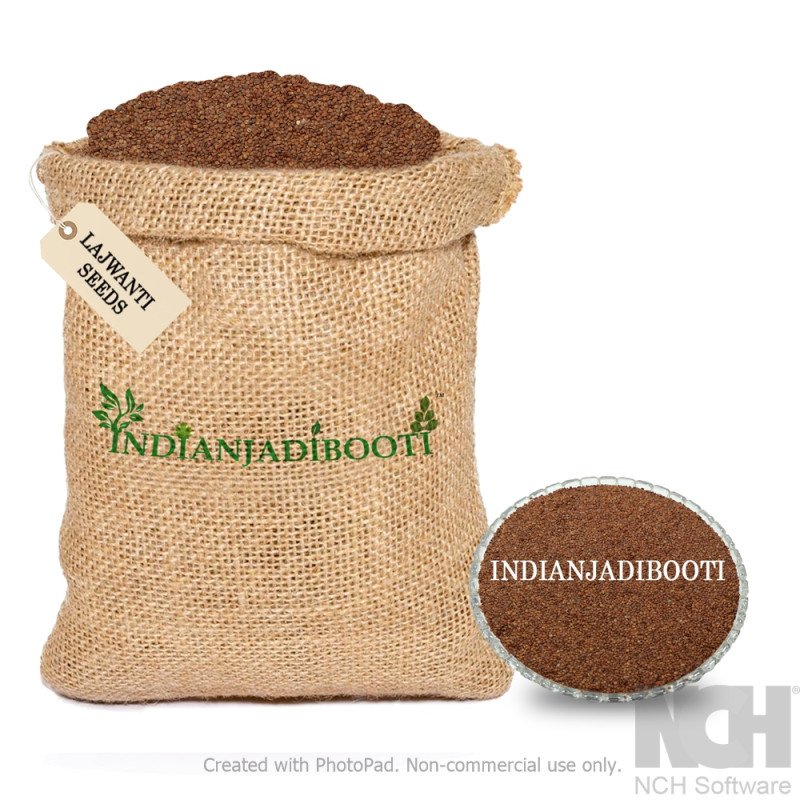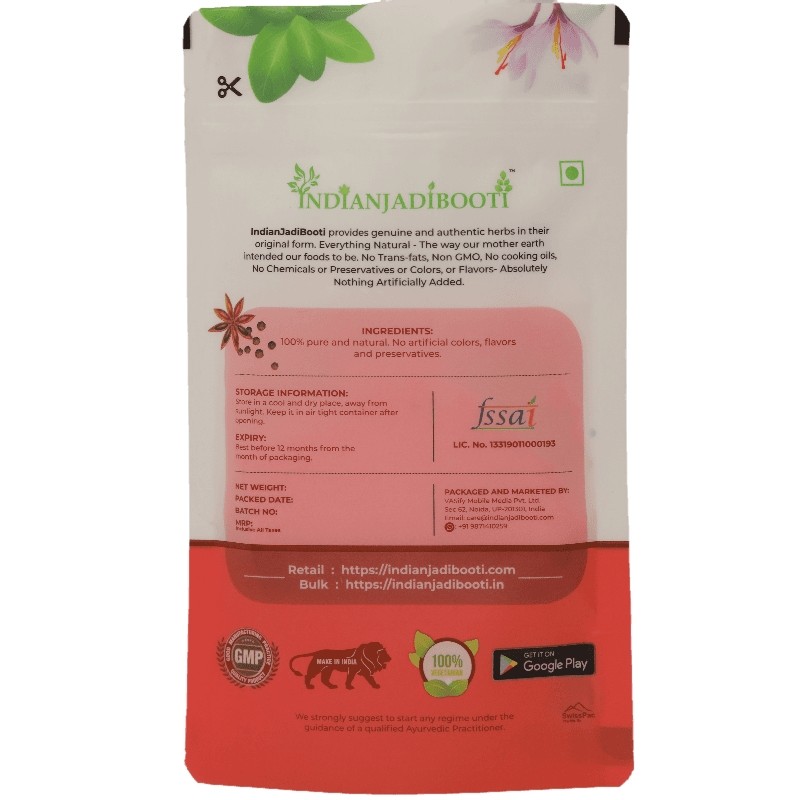

















- Stock: In Stock
- SKU: HERB000347
- Shipping: Free within India upto 10KG
- Quality: Premium Herbs with No Adulteration
- Delivery: Within 3 to 7 Working Days in India
- Shipping: From Delhi based Facility
- Transport Charges for 25KG and above: Extra on To Pay
- COD Available: Max Limit: 2 Kg and Rs 3500 per order
- Discount on Prepaid Orders: Rs 50/- off. Auto Apply on Checkout.
Available Options
Description
Commonly referred to as the "Touch-me-not" or "Lajwanti" plant, Lajvanti is valued both for its decorative qualities and its varied medicinal uses. Its Botanical name is "Mimosa pudica".
The seeds of this plant are employed in the treatment of both acute and persistent urinary tract infections. Additionally, these seeds serve as a remedy for disorders related to women's reproductive health.
This plant is a rich source of therapeutic properties and provides numerous health benefits:
Lajvanti Addresses Hemorrhoids
Poor dietary habits and lack of activity often in constipation which can disturb Vata dosha due to diminished digestive fire. Known as Arsh in Ayurveda, hemorrhoids occur from swollen veins in the rectal area leading to discomfort, itching, or a burning sensation.
Lajvanti Seeds are effective in treating this condition by cooling and soothing the affected area and reducing inflammation through its Vata balancing attributes and the presence of mimosin, an alkaloid that eases pain and swelling specifically linked to hemorrhoids.
Lajvanti Soothes Skin Conditions
Extracts from the Lajvanti plant are instrumental in managing various skin disorders like dermatitis, fungal infections, rashes, acne, and psoriasis, owing to its antibacterial properties that combat skin infections effectively. The roots are particularly used in treating vitiligo, a condition characterized by the loss of skin pigmentation.
Lajvanti Eases Migraines
Migraines and severe headaches, often resulting from an aggravated Pitta dosha, are alleviated by Lajvanti's Pitta balancing capabilities. Applying a thick paste made from Lajvanti leaves directly to the forehead can relieve head pain.
Lajvanti Mitigates Diarrhea
Known as Atisar in Ayurveda, diarrhea stems from factors like contaminated water, improper diet, toxins, mental strain, and weak digestive fire (Agnimandya), all contributing to a Kapha dosha imbalance. This leads to symptoms such as loose stools, flatulence, indigestion, and dysentery. Lajvanti is beneficial in this regard for digesting Ama and balancing Kapha dosha to alleviate these symptoms.
Lajvanti Combats Alopecia Areata
Alopecia Areata, identified by sudden and significant hair loss resulting in bald patches, is typically linked to an unbalanced Pitta dosha. The Lajvanti plant helps reduce the severity of hair fall and baldness by restoring balance to Pitta dosha.
Lajvanti Enhances Male Sexual Health
The seeds of Lajvanti are highly effective in enhancing sexual potency, particularly addressing issues like erectile dysfunction, low sperm count, and premature ejaculation in men, thanks to its aphrodisiac properties.
Lajvanti Neutralizes Venom from Bites
Historically used as an antidote in ancient practices, Lajvanti possesses anti-venom properties making it effective against the bites from snakes, such as cobras, and scorpions, as well as various insect stings. The application of leaf and stem juice can alleviate minor insect bites, while a decoction of the roots is used for treating snake bites to counteract toxicity.
For Lajwanti Seeds Benefits in Details, Please read: Lajwanti Seeds Benefits
Other Names: Lajak, Lajjavati, Han xiu cao, Sensitive Plant, Humble Plant, Touch Me Not, Shyness Grass, Sensitive commune, Herbe pudique ou Vive mimuese, Mimose, Schamhafte Sinnpflanze, Risamani, Lajavanti, Lajamani, Chui Mui, Choti Mui, Lajwanti, Lajvanti, Lajja, Lajak, Lajjaru, Lajaru, Muttidasenui, Machikegide, Lajjavati, Mimosa pudica Linn, Lajalu, Lajan, Lajjalu, Samanga, Namaskari, Chhuimui,sensitive plant, touch me not - chui-mui-lajwanti -kangphal, kangphal ikaithabi - thottaccurungi - tintarmani -thottavaadi - lajjabati, lajwanti ke beej price lajwanti seeds, Lajwanti Seeds , Mimosa pudica, Lajvanti Beej, Chui Mui, Lajawanti, Tukhme Lazvanti, Tukhme Lazwanti, Lajbanti lajwanti seeds lajvanti beej chui mui, Lajavanti, Lajjalu, Laajwanti, Laajvanti, Chuimui Seeds lajwanti seeds lajvanti beej chui mui mimosa pud,Lajwanti Seeds , Mimosa pudica, Lajvanti Beej, Chui Mui, Lajawanti, Tukhme Lazvanti, Tukhme Lazwanti, Lajbanti lajwanti seeds lajvanti beej chui mui, Lajavanti, Lajjalu, Laajwanti, Laajvanti, Chuimui Seeds, Lajwanthi, Lajvanthi, Lajallu, Mukkutti, Mukutti, Biophytum Sensitivum, Svagupta
Reviews
100% Customers recommend this product
-
5 Awesome90.32%
-
4 Great9.68%
-
3 Average0%
-
2 Bad0%
-
1 Poor0%
Reviews Over Lajvanti (Seeds) - Lajwanti (Beej) - Lajallu - Chui Mui - Touch Me Not - Mimosa Pudica by IndianJadiBooti
- (4.9)
Total Reviews (31)
click here write review to add review for this product.
-
(0)
-
(0)
-
(0)
-
(0)
-
(0)
Report this review.

What is Lajwanti Seeds

-
Lajwanti seeds, also known as Mimosa Pudica seeds, come from a plant often referred to as the "sensitive plant" or "touch-me-not" due to its rapid leaf movements when touched. Mimosa Pudica is native to tropical regions of Central and South America but has become widely naturalized in other parts of the world, including Asia and Africa. The seeds have gained interest for their medicinal properties in Ayurvedic and traditional herbal medicine.
Urinary Health: They are used in traditional remedies to treat urinary tract infections and help manage urinary incontinence.
Blood Sugar Regulation: Some studies suggest that lajwanti seeds may help in lowering blood sugar levels, potentially benefiting those with sugar problems.
Menstrual Relief: The seeds are believed to help regulate menstrual cycles and relieve menstrual discomfort or cramps.
Joint Pain Relief: Their anti-inflammatory properties make lajwanti seeds useful in reducing joint pain, especially in conditions like joint pain
Health Benefits of Lajwanti Seeds

Overall Health
Lajwanti seeds contain powerful antioxidants that help neutralize free radicals, protecting cells from oxidative stress. This can contribute to overall health, reducing the risk of chronic diseases and slowing down the aging process. Read More

Anti-parasitic Effects
The seeds are known for their ability to expel intestinal parasites. They have been used in traditional medicine to treat parasitic infections, particularly in the digestive tract, by eliminating worms and other parasites. Read More

Digestive Health
Lajwanti seeds have astringent properties, which make them effective in treating digestive disorders like diarrhea. They help control excessive water loss in the intestines, promoting digestive balance. Read More

Nervous System Calming
The seeds are used in Ayurvedic medicine to calm the nervous system, helping to alleviate stress, anxiety. They possess mild sedative properties, which can aid in relaxation and improving sleep quality.

Anti-inflammatory & wound-healing
The main benefit of lajwanti seeds (Mimosa pudica seeds) is their anti-inflammatory and wound-healing properties. Traditional medicine, particularly Ayurveda, frequently uses these seeds to treat wounds, reduce inflammation, and accelerate healing. The seeds contain compounds that help in reducing swelling, controlling pain, and preventing infections, making them highly valuable for both internal and external healing processes.
This wound-healing benefit is supported by their antimicrobial activity, which helps protect against infections when applied to cuts, abrasions, or sores. Additionally, these seeds are commonly used for gastrointestinal health, particularly in treating diarrhea.
How to Use Lajwanti Seeds

For Wound Healing and Anti-inflammatory Effects
Method: Make a paste by grinding lajwanti seeds with a little water.
Application: Apply the paste directly to wounds, cuts, or inflamed areas to reduce swelling and promote faster healing. Leave it on for 20-30 minutes before washing off.
Frequency: Once or twice daily until the wound heals.

For Digestive Health
Method: Dry and grind the seeds into a powder.
Dosage: Mix 1 teaspoon of the powder with water or honey and consume it once a day.
Frequency: Take it once daily until symptoms improve.

Intestinal Parasites
Method: Boil seeds to make a decoction.
Dosage: Drink 100–150 ml on an empty stomach for 3–5 days.
FAQ
The touch-me-not plant is well-known for its mysterious shrinking ability, but it also has a number of health benefits.
- Heals wounds and cuts
- It heals piles and hemorrhoids.
- Relieves joint pain and arthritis.
- Aids in the treatment of diabetes
- Helps with indigestion and diarrhea
- Beneficial for itching
- Used to treat impotency and premature ejaculation.
- Prevent hair root thinning by managing unnatural hair fall
- Increases sperm count by thickening the sperm.
- Abnormal menstrual bleeding
- Handle insect bites
For Detailed Benefits of Mimosa Pudia Seeds, please read : Benefits of Lajwanti Seeds - Lajvanti Beej - Chui Mui - Mimosa pudica
How to Consume Lajwanti Seeds?
Lajwanti seeds are typically ingested in a powdered form. Mix a teaspoon of the seed powder with water or milk and take it once or twice a day to boost overall health. You can also incorporate the powder into your meals or herbal teas.
Lajwanti Seeds Benefits for Male
Antioxidant properties: Mimosa pudica seeds are rich in flavonoids and other compounds that possess antioxidant qualities. These antioxidants may help safeguard cells from damage caused by free radicals, promoting overall health and wellness, including for men.
Lajvanti aids in regulating blood sugar levels by enhancing insulin secretion, thanks to its antioxidant properties. It is beneficial for urinary issues as it promotes urine production due to its diuretic nature. Additionally, Lajvanti may assist in managing epilepsy because of its anticonvulsant characteristics.















